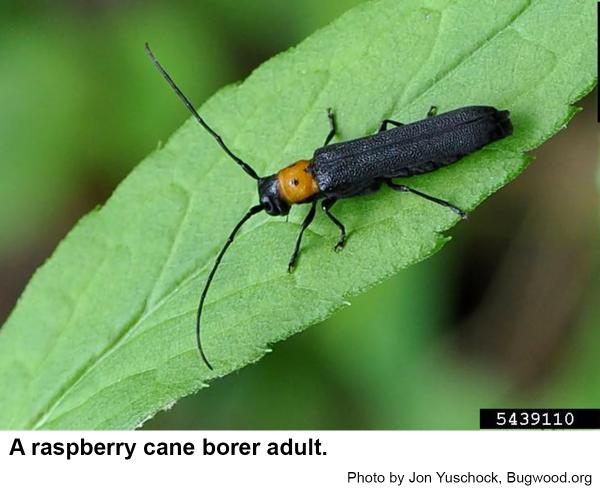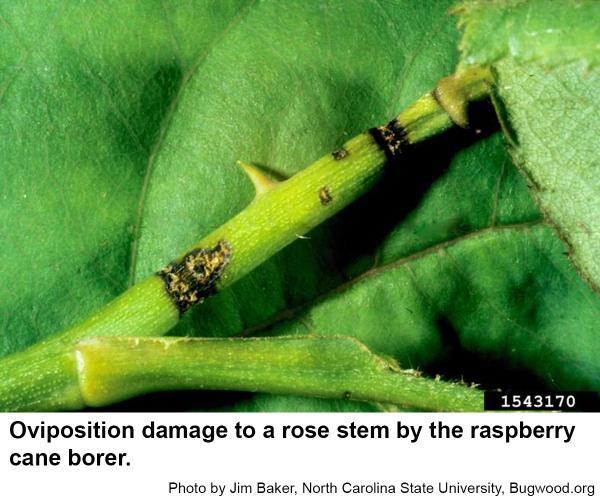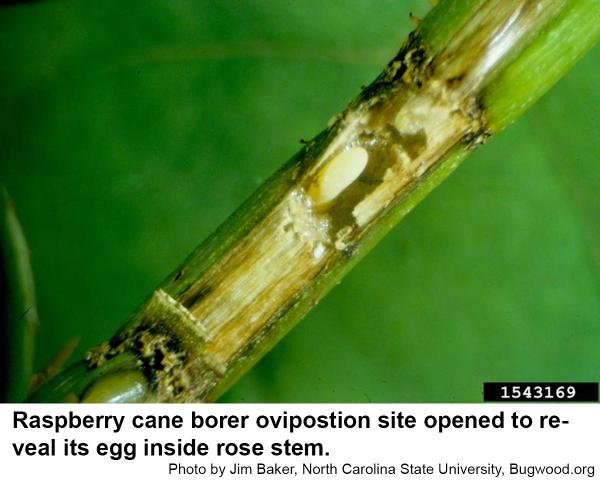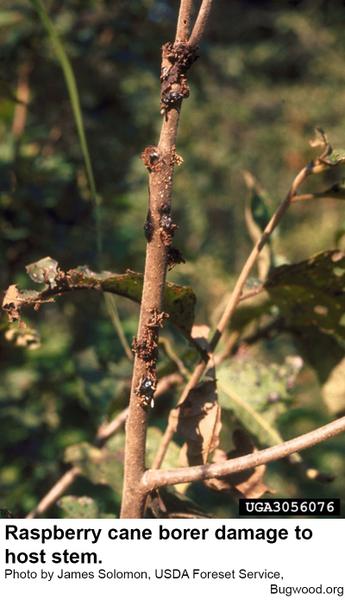Description and Biology
The raspberry cane borer, Oberea bimaculata, is a small, slender, black or very dark beetle with long antennae. It is 1/2 to 5/8 inch long. The thorax is yellow to orange and has two conspicuous spots. Females emerge from infested stems in late spring and summer and fly to the new growth. About six inches from the tip, they chew a line of holes all the way around the new growth and then they chew another line of holes about half an inch away. Between these rows of holes the beetles insert a single egg into the stem. By early July, eggs mature and a chunky, small, white grub hatches and begins to feed within the pith. As the grub bores downward it grows and becomes more slender. The stem dies and wilts above the area girdled by the beetle. The grub continues to bore downward and eventually reaches the base of the plant where sawdust and other waste products and pushed out of holes onto the ground. The grub usually overwinters in a cell excavated inside the plant close to the ground. The following spring the grub matures and molts into a pupal stage. A few weeks later, a new generation of beetles emerges from infested plants to continue the life cycle. Some grubs take two years to mature. Infested branches often die or they are so weakened that they break off easily.
Host Plants
Raspberry cane borers have been reported from brambles and raspberry as well as azalea, rose, and even oak.
Residential Recommendations
For control of raspberry cane borers, the plants can be sprayed with a pyrethroid insecticide in late spring after the new growth has matured somewhat to prevent the beetles from laying eggs. Pyrethroid insecticides are widely available in the garden section of big box stores. When used as directed, pyrethroids are very toxic to insects but are not particularly hazardous to humans and pets (other than fish-avoid using pyrethroids around pools, ponds, and streams). (It is probably not a good idea to spray tender new growth of trees and shrubs with insecticides as the leaves may be damaged.) Susceptible plants should be watched for wilting stems. Prune out infested branches as soon as wilting is noticed, and then burn or otherwise destroy them to prevent the beetle grubs from surviving to produce more beetles next year. It is probably a good idea to treat these plants again the next spring. Fortunately, these stem borers are sporadic pests so that treatment is probably not needed every year. If the problem is discovered one season and treated the following spring as well, the population of raspberry cane borers will probably abate naturally.
References
- Beetles of the Genera Saperda and Oberea Known to Occur in New Jersey. Mutchler, A. J. and H. B. Weiss. 1923. State of New Jersey Dept. Ag. Circular No. 58. 26 pages.
- Rednecked and Raspberry Cane Borers. Bessin, R. 2004 (revised). University of Kentucky College of Agriculture. ENTFACT-209.
- Raspberry Cane Borer. Anonymous. 2016. PennState Extension. Home Lawn and Garden. Insect and Mite Pests. Penn State College of Agricultural Sciences.
- Extension Plant Pathology Publications and Factsheets
- Horticultural Science Publications
- North Carolina Agricultural Chemicals Manual
For assistance with a specific problem, contact your local Cooperative Extension Center.
This Factsheet hs not been peer reviewed.
Publication date: July 23, 2016
Reviewed/Revised: Oct. 11, 2019
Recommendations for the use of agricultural chemicals are included in this publication as a convenience to the reader. The use of brand names and any mention or listing of commercial products or services in this publication does not imply endorsement by NC State University or N.C. A&T State University nor discrimination against similar products or services not mentioned. Individuals who use agricultural chemicals are responsible for ensuring that the intended use complies with current regulations and conforms to the product label. Be sure to obtain current information about usage regulations and examine a current product label before applying any chemical. For assistance, contact your local N.C. Cooperative Extension county center.
N.C. Cooperative Extension prohibits discrimination and harassment regardless of age, color, disability, family and marital status, gender identity, national origin, political beliefs, race, religion, sex (including pregnancy), sexual orientation and veteran status.




